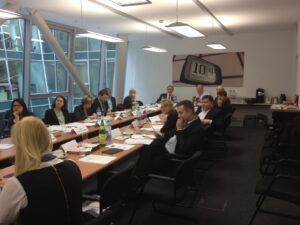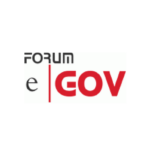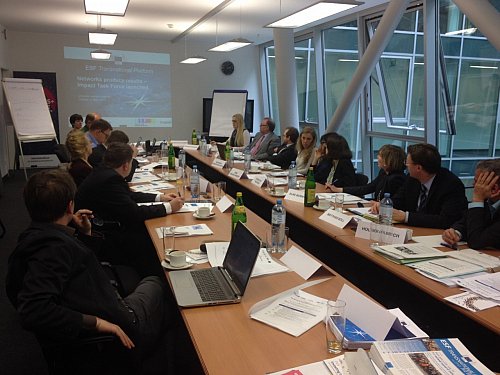JOINING FORCES FOR BETTER PUBLIC SERVICES AND SOCIAL INCLUSION
On the 4th and 5th of May, the coordinators of Priority Area 9 “People and Skills” and Priority Area 10 “Institutional Capacity & Cooperation” invited the representatives of the Managing Authorities of the European Social Fund (ESF), of the European Commission (DG EMP), of Interact as well as of the ESF Baltic Sea Network in to the 3rd Meeting of ESF Managing Authorities in the Danube Region in Vienna.
The meeting focused on transnational cooperation in the European Social Fund including the cooperation between operational programmes in the Danube Region and the EU Strategy for the Danube Region. Furthermore, the participants discussed opportunities for lean fund management regarding the up-coming funding period.
In his welcome note, Johann Sollgruber, Deputy Trade Commissioner at the Austrian Permanent Representation, pointed out the positive development towards closer cooperation between the Structural and Investment programmes in the region.
Lucio Battistotti and Jader Cané from the European Commission, DG EMPLOYEMENT, presented the links between the macro-regional strategies and the European Social Fund. In this regard, a special emphasis lies on transnational cooperation which reconciles the objectives in the operational programmes with the targets of the EU Strategy for the Danube Region. According to the European Commission “Managing Authorities may find it profitable to focus transnational cooperation on specific regions or member states by creating synergies with EU macro-regional strategies. In practice this happens where regions or member states are involved in a macro-regional strategy that covers key labour market and social inclusion challenges which correspond with themes that can be selected for transnational cooperation.”
MAKE TRANSNATIONAL COOPERATION WORK IN SOCIAL POLICY WORK
Transnational cooperation is an effective tool to develop solutions to common challenges and to learn from peers. Therefore, AEIDL and Interact provide support to Managing Authorities ranging from supporting a framework for transnational calls or coordinated calls to establishing transnational project tandems and capitalization.
Toby Johnson, AEIDL, presented the transnational ESF platforms that are commissioned by DG EMPLOYMENT. The platform provides guidance for transnational cooperation and exchange between Managing Authorities on thematic priorities. Furthermore, the platform provides a project database that facilitates partner search. However, Toby Johnson recommended not to rely exclusively on the database, but to use different channels in order to find competent and reliable partners.
The stakeholder platforms of the EUSDR Priority Areas can be also good sources to meet potential project partners from the Danube Region.
Additionally, the capacity-building programme Interact provides opportunities for capitalization. Although Interact mainly focuses on programmes of European Territorial Cooperation, there are numerous links to the ESF such as  transnational projects dealing with access to labour markets, education and public services. Jörg Mirtl, policy officer at Interact, presented a recent study on alignment of funds commissioned by Interact that shows how well the macro-regional strategies are connected to the ESIF. Although there is an overall commitment to the strategies in the Operational Programmes, the study shows, that the more concrete programme implementation gets, the less macro-regional strategies are taken into account.
transnational projects dealing with access to labour markets, education and public services. Jörg Mirtl, policy officer at Interact, presented a recent study on alignment of funds commissioned by Interact that shows how well the macro-regional strategies are connected to the ESIF. Although there is an overall commitment to the strategies in the Operational Programmes, the study shows, that the more concrete programme implementation gets, the less macro-regional strategies are taken into account.
WHAT WE CAN LEARN FROM THE BALTIC SEA?
Ulrich Wolff from the Managing Authority in Hamburg and member of the ESF Baltic Sea Network, Anders Bergstrom, EUSBSR Policy Area Coordinator “Education” and Horizontal Action Coordinator “Capacity” as well as Susanne von Bonin, project partner of the mission possible network presented the experiences from the Baltic Sea Region. Ulrich Wolff pointed out a crucial success factor for coordinating call or project cooperations: “For the success of transnational cooperation it is important to focus on one topic and avoid dispersion.” The transnational platform of AEIDL became a close partner of the Baltic Sea Network in regard of transnational partner search.
Anders Bergstrom presented the concept of flagship platforms which are thematic groupings of core stakeholders in the region. These partnerships organize regular seminars and create leverage for specific topics in order to support policymaking and focused project development. Drawing from the experience in the Baltic Sea, Anders Bergstrom stressed that not only the projects and activities are important, but also the way of thinking and organising transnational cooperation.
Susanne von Bonin presented transnational cooperation from the project promoters’ point of view and highlighted the added value of transnational cooperation for the beneficiaries as well as for project partners. However, she also discussed the challenges that project consortia face, if partners drop out of the project during implementation. However, macro-regional strategies can be a good source for support as the Priority Areas provide a platform to work with stakeholders on their commitment towards transnational cooperation and therefore create a pool of competent and motivated project promoters. This is also one of the benefits from the macro-regional strategies.
ESF TRANSNATIONAL COOPERATION IN THE DANUBE REGION
Irina Tsekova Ivanova from the Bulgarian ESF Managing Authority presented the first experiences with transnational calls. ESF Bulgaria launched a transnational call in the Danube Region until April 2017. While the call generated transnational project partnerships in the Danube Region and positive experiences in terms of awareness raising in Bulgaria, beneficiaries faced some challenges in regard to finding transnational project partners or funding of the foreign partner. The first experiences showed that project partners might benefit from better coordination between Managing Authorities as it might create better synergies between projects and provide funding for all partners in a transnational project partnership.
Holger Albrich from the ESF MA in Baden-Württemberg presented the results of a beneficiaries workshop in Baden-Württemberg where the prerequisites of transnational partnerships were discussed. The participating project partners showed great interest in transnational cooperation with special regard to project tandems that include peer-learning exercises. In a first step, some of the project partners prepared project profiles for partner search in the Danube Region. The participants of the ESF Meeting discussed possibilities to support the project partners in finding competent partners.
PERSPECTIVES FOR 2020+: DISCUSSION ON LEAN FUND MANAGEMENT
Finally, Matthias Boll from the ESF MA in Baden-Württemberg presented the position paper of Germany’s Federal ESF Managing Authorities for Lean Fund Management. The paper entails proposals to facilitate the setup of Structural programmes and project implementation for beneficiaries. The participants of the ESF Network welcomed the endeavour of the German colleagues and discussed the paper.




